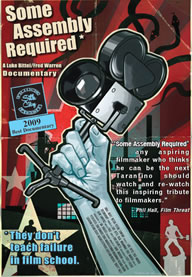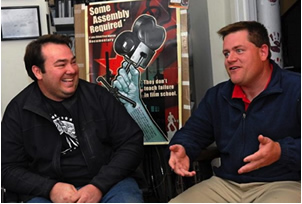Some Assembly Required:
They Don't Teach Failure in Film School
MovieBytes Interview with Luke Bittel and Fred Warren When Luke Bittel's first directorial feature - Help Wanted - didn't turn out as well as he anticipated, he decided to make to make lemonade out of lemons by making a documentary about the "unmaking" of this ill-fated project. The documentary, co-directed with Fred Warren, is an unblinking confessional titled Some Assembly Required, and chronicles an astonishing litany of missteps by the fledgling filmmakers. The project is available for purchase online , and is worth watching for anyone contemplating self-production as a way to break into the film industry.
When Luke Bittel's first directorial feature - Help Wanted - didn't turn out as well as he anticipated, he decided to make to make lemonade out of lemons by making a documentary about the "unmaking" of this ill-fated project. The documentary, co-directed with Fred Warren, is an unblinking confessional titled Some Assembly Required, and chronicles an astonishing litany of missteps by the fledgling filmmakers. The project is available for purchase online , and is worth watching for anyone contemplating self-production as a way to break into the film industry.
MovieBytes: What inspired you to direct Help Wanted?
Luke Bittel: Inspiration is a strong word. I would say fear is what motivated me to co-direct Help Wanted. I had opened the first all-dvd rental store in Massachusetts and two years had gone by and I was concerned I was getting farther away from what I really wanted to do. I wanted to make movies.
MovieBytes: Where did you find the script?
LB: I found the script purely by accident. The Writer (and co-director) of Help Wanted was a customer of my dvd rental store. The two us got to talking and the next thing I knew we were figuring out how to put the script into production.
MovieBytes: Did you consider producing any other screenplays before selecting this one?
LB: I had written my own screenplays, but the reality was they where not in any condition to get made. Bilal Muhammad, one of the film's producers, responded to the script like I did - it wasn't overly complicated to shoot. So he and I and the writer each came up with a thousand dollars figuring in our naiveté that it would be enough. I think that money got us to New York City for the auditions and gave us just enough to get back.
MovieBytes: What kind of deal did you make?
LB: We had an "Experimental Feature agreement" with the Screen Actors Guild, and that was the deal across the board for everyone. The writer kept putting off signing the contract until Bilal and myself cornered him at a table between shots. We where getting very nervous. That was our first mistake. Before we did anything we should have had him sign over the rights. Now contracts to me are before anything else.
MovieBytes: How did you get John Cullum (Northern Exposure) interested in this project? Was he working for free, or were you able to pay him?
LB: Mr. Cullum received the sides from his agent, I believe, and he saw something that I didn't. To this day I'm not sure why he and his son JD took a chance on us. I did everything I could to lay out the fact that we had nothing. To their credit they still wanted to be part of the project. John and the other SAG actors had a per diem and the production paid for hotels and travel.
MovieBytes: Although this was a micro-budget film, your documentary makes it clear that your costs spiralled out of control pretty quickly. Did you have investors, or were you using your own cash?
LB: Cost spiraled out of control is a nice way of putting it. I was so focused on having everything we needed that I was only sporadically focused on the budget. My Parents Erin and Peter contributed a lot to this project as did Fred Warren and a lot of others. At this moment, with all the money invested, we'd have to break fifty thousand all in for the cost of both the film and documentary.
Fred Warren: For those with knowledge of the project, myself included, we wanted this to succeed. That was the main reason I had offered to help first as a PA and then, when the bank account ran dry, as a producer. At least for me, there was never the idea that this would lead to some large monetary return. In the end, it was more about seeing someone you know achieve their goal and make good on what they had set out to do.
MovieBytes: At what point in the process did you realize that things weren't going well?
LB: The day before we started, I had an overwhelming panic attack and knew I was in over my head. Talking about making a movie and making a movie, I discovered, where two vastly different things.
MovieBytes: Sounds like your relationship with the screenwriter disintegrated pretty badly.
LB: My relationship with the screenwriter did disintegrate, as did my relationship with the rest of the crew. Fred Warren is the only one who still talks with me. Watching the behind the scenes footage was like watching game footage after a horrible loss. I saw myself and I was the asshole. I can see it now and I don't ever want to be that kind of director again. My behavior was rude and angry it caused stress among the crew. I lost a lot of friends because of how I acted.
FW: We really did want him to participate in the documentary, after several phone conversations, he passed. I think that there was a sense on his part that he was going to be made out to be the scapegoat. He never said that to me, but I got the sense that he was suspicious. As an aspiring writer, I can understand his lack of trust after Help Wanted. It was something he had put his heart into and we ripped it to shreds. It's hard to get past that.
MovieBytes: How did Mr. Cullum react when he saw the finished film?
LB: Mr. Cullum's reaction was kind and thoughtful, but in the end he and his son JD felt that there wasn't anything more that could be done to save the picture. I let it be. Mr. Cullum was a complete professional surrounded by a bunch of amateurs. Just him agreeing to sign onto Help Wanted was more than I could ask for.
MovieBytes: What inspired you to revisit Help Wanted through a documentary about the production?

Luke Bittel and Fred Warren
FW: We were trying to figure out if there was anything that could possibly be done with Help Wanted. Was there some editing trick we could do to make this interesting? Could we do something like Memento or Pulp Fiction with the editing and make the film interesting? Maybe we could turn it into a mock-u-mentary. Luke, Bilal and I would meet every other week at a local diner and go over ideas. I had started to put together a "script" of what we could do when Luke mentioned something about a top ten list.
From there, we worked on a game plan. We had the ten things we did wrong, we started editing, we headed out to LA to get a couple shots that might add something to the documentary. Our energy was reignited but others had moved past the project and did not see the possibility. They wished us well but wanted to forget about Help Wanted. It was certainly an understandable decision but it fueled Luke and I even more. Not necessarily to prove them wrong but rather to pay them back for all they had done to get us to the point we were at.
MovieBytes: Luke, Some Assembly Required is not an especially flattering portrait of you as a director. Do you think those criticisms are fair?
LB: That's a great question. I think in this day and age of spin, it's a refreshing to see someone stand up and take responsibility for how they screwed up. Help Wanted is awful and I'm to blame. There are others but I was the director and the fault was mine. Some Assembly Required documents the how and where and why - it's an honest documentary about indie film making. I think the criticism was more than fair. We learn, we move on and get ready for the next film.
Updated: 04/03/2014
ScriptLinks
Post Your Script Here!FURGROW BIRDS SPIRITUAL ROSE
When a dog loses his owner and home, he discovers a dark conspiracy involving an evil king, a hidden realm, and God's magical crystals used to alter the world.
Furgrow Birds back to the beginning
When a dog loses his owner and home, he discovers a dark conspiracy involving an evil king, a hidden realm, and God's magical crystals used to alter the world.
Yrrem Samtsirhc from Mars
A gentle, highly intelligent alien crash-lands in a small town just before Christmas and forms an unlikely friendship with a girl with Down syndrome.
Twenty Last Summers
When a longtime group of friends in their fifties and sixties jokingly ask themselves, “What if we only had twenty summers left?”, the question unexpectedly detonates their comfortable routines, sending each of them into a spiral of hilarious missteps, overdue confrontations, and clumsy attempts at self-reinvention.
New Jack Hustlers: New Jacks
When a new synthetic drug floods New York City, a promising young officer is sent undercover into the nightlife scene, where criminal innovation, institutional ambition, and personal survival collide—forcing her to decide who she’s willing to become to stay alive.
“Be prepared for what?” Episode 2: THE BOY WHO EARNED HIS MAGIC
Howell and friends arrive at a school in the desert where they prepare to face evil forces.
The Huntsman
A battle-hardened Starship crew faces their greatest test when a routine extraction mission unleashes a mind-altering alien force, fracturing loyalties and awakening a cosmic mystery that could reshape the fate of the universe.
Wendigo
After a series of brutal killings in Algonquin Provincial Park linked to a missing hiker transformed into a mythical Wendigo, an elite military team must join forces with local rangers and a Native American tracker to stop the ancient creature's reign of terror before more innocent lives are lost.
Doc Savage: Dark Empire
In the shadow of World War II, Doc Savage, the legendary Man of Bronze, embarks on a daring mission to dismantle Nazi superweapons, rescue the woman he loves, and confront a dark legacy tied to his own past — all while battling the forces of tyranny and fighting for the future of humanity.
Xanadu Shores: SEAN LANDERS Intro 10 Pages.
A pilot returns home anticipating matrimony soon learning his fiance has cleaned out their wedding account and moved to Las Vegas.



